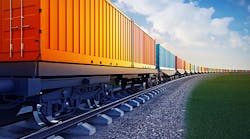COMMENTARY & ANALYSIS
The agenda of the two-day hearing held by the Surface Transportation Board (STB) in late May was supposed to focus on skyrocketing freight rail demurrage and accessorial fees, but it quickly became clear that the real subject was the Class 1 railroads’ growing abuse of their near-monopoly power in the face of a regulatory scheme not designed to deal with it.
In her opening statement, STB chairman Ann Begeman pointedly remarked on the fact that the crowded hearing room showed rail customers’ outrage over the railroad intimidation tactics had overcome any fear they had about testifying, noting the railroads previous attempts to intimidate them from complaining before a commission listening session held in late 2017.
“When we announced the hearing, I didn’t pause wondering if anyone besides the railroads—who asked to be here—would show up,” she said. “The last listening session I attended, I learned later that every single participant had been contacted by the carrier in advance of the hearing not to come.”
She and the other two members of the board (recently confirmed fellow Republican and vice chairman Patrick Fuchs, and Democrat member Martin Oberman) then got an earful from rail shippers about high fees imposed recently by the railroads and what should be done about them. Over the two days of the hearing, the board seemed genuinely concerned and promised to take action to correct the egregious rail practices exposed by shippers.
The hearing targeted the behavior of three Class 1 railroads—CSX, Union Pacific and Norfolk Southern—which have embraced an operating model called Precision Scheduled Railroading (PSR), which critics say is designed to make enriching investors their top priority, a goal obtained by cutting personnel, sidelining rail equipment and reducing service while increasing rates and fees in the regions where they enjoy near-monopolies.
In their comments, shippers both large and small painted a devastating picture of major railroads creating a system that not only allows them to push more of their costs onto their customers, but also permits them to charge additional fees for the main purpose of squeezing even more profits out of their operations.
Executives of the railroads under fire reiterated their position that high demurrage and other accessorial fees are necessary to prompt shippers to end inefficient practices by returning railcars more quickly and adopting more efficient loading and unloading practices. If they do so, their costs will come down, they argued. This is simply not so, the shippers told the STB.
By this spring, all three railroads had cut the period they allow for a receiving customer to unload a car in most cases from the previous 48 hours to 24 hours or less and imposed other new fees. In many instances, it is technically impossible for the customer to unload a train in the time provided. In one such example, the railroad cut back service to a location from five days a week, with weekend days excluded, to three days a week and weekend days are counted towards demurrage although no staff is available to do the unloading.
Paying for Service Failures
In some situations, the receiver is suddenly faced with unloading many more railcars than it has planned for and has the capacity to deal with because they were delivered without warning due to “Bunching” and “Constructive Placement” of railcars—both euphemisms for service failures that tie up traffic on railroads that have embraced PSR.
Bunching is when grouping cars shipped at different times are consolidated for delivery, which overloads shippers’ sidings and results in increased demurrage bills. Constructive Placement means the demurrage clock starts ticking when the railcars are stopped somewhere along the rail line or in a yard where they cannot be unloaded by the receivers, as opposed to Actual Placement at the customer’s facility.
Shippers say these occur due to inefficient rail operations, not to delays they have caused. As a result, they argue, PSR ends up meaning that the railroads simply push the cost of these service failures onto their shippers, who then are forced to add them to the prices the average consumer has to pay. However, as several witnesses told the STB, calculations of the demurrage fees being charged to receivers who hold onto railcars for more than 24 hours easily show they far exceed any justifiable cost recovery.
“Presently, the railroads appear to be calculating demurrage as a revenue source while ignoring reduced or missed service days, bunching and unreasonable constructive placement practices which all play a huge role in causing demurrage,” said W. Paul Delp, president of Lansdale Warehouses. The industry norm of 48 hours to unload a car has been reduced to 24 hours or less, and the use of credit days to offset debit days has disappeared, he added. “It is next to impossible to avoid a demurrage invoice.”
Dwell time also stays the same even when cars are delivered late because of rail service failures, according to Delp’s fellow third-party logistics warehouse operator Carol Keup, CEO of Valley Distributing & Storage Company. “The internal and legal cost in disputing rail demurrage charges providing loading and unloading services can now quickly outweigh the benefit of providing rail freight services,” Keup said.
She also pointed to demurrage being assessed by including days when scheduled rail service is not available or is interrupted by constructive placement. “It is inequitable for us to be financially responsible for events out of our control.”
Steve DeHaan, president of the International Warehouse Logistics Association, told the board, “A warehouse has no control or input into when, how, the timing, what is reasonable, about individual and minute changes in demurrage tariffs.”
He observed that six years ago, one railcar for one day’s demurrage was $50, then it was increased to $75, then to $100, then to $150, and now some are at $200. A 400% increase, and most Class 1 railroads have gone to a 24-hour unload time vs. the previous standard of 48 hours, which again doubles demurrage charges.
“This is an 800% increase in demurrage charges in six years,” DeHaan said. “The increase is so much that it is now 3% of the overall railroad revenues. I view this as flogging the back of every of American who has to pay the increased price for their goods where the railroads are involved.”
The Wider Impact
The impact felt by relatively small 3PLs is far exceeded by the massive costs that have been sustained by major manufacturers, including chemical and food producers.
“NS, a revenue adequate carrier, appears more concerned about earning revenues on captive traffic than solving its purported congestion issues,” Jeff Baker, a purchasing executive at chemical manufacturer Dow Inc., told the STB.
Rail service failures have had serious consequences for Dow and its customers, he explained. “The materials that Dow receives and ships by rail are necessary for Dow and its customers to operate. Thus, at the very least, rail service failures require Dow and its customers to maintain excess inventory of rail shipments and the additional railcars and storage needed to support this inventory.” This makes increases in demurrage charges and congestion fees by NS even more onerous.
“Moreover, service failures can and do cause Dow to reduce or suspend operations,” Baker stressed. “These operational slowdowns and shutdowns are costly, because they result in lost business, they end with startup operations that often consume substantial raw materials without producing acceptable finished product, and they do not absolve Dow of its obligations to pay for the staffing, equipment and facilities involved in the operation.”
His mention of shutdowns is significant. At the height of the CSX service failures in 2017, several shippers got the attention of the STB when they said some of their production and plant facilities came dangerously close to shutting down because of delayed deliveries. Baker was revealing that this has actually happened to his company with NS.
New congestion fees NS charges its customers are another big issue for Dow. Baker cited the example of his company’s Kankakee, Ill., facility. Captive to NS (meaning no other railroad serves the location), the railroad applies the congestion charge when it delivers an excessive quantity of cars to a consignee, resulting in congestion at its location.
Dow estimates that in 2019 it will incur $600,000 in congestion charges for Kankakee, on top of storage charges. Last year congestion charges at that location totaled $194,000.
Dow urged the board to investigate whether the railroads are reporting revenue from all demurrage, storage and accessorial charges in their STB quarterly reports. It also seeks new rules regarding billing and disputing these fees, and requiring railroads to make available to customers data needed to audit storage charges and accessorial fees. The rules also should specify a minimum period for filing disputes, establish clear deadlines for railroads to respond to disputes, and prohibit “handling” fees that merely serve to discourage claims, Baker said.
These mirror similar solutions put forward by other shippers, including the return to a 48-hour period for unloading and requiring the clock for unloading to begin only when actual placement of the cars takes place instead of constructive placement.
Although the STB members voiced their own concerns about the litany of abuses paraded before them and seemed genuinely sympathetic to shippers’ suggested solutions, it remains to be seen what actions they can or will take. Their enforcement powers, even after they were expanded by congressional action just a few years ago, are limited and they are facing some of the wealthiest and most powerful corporations in America today. It may take Congress to rein the railroads in, much like they did in the 1880s.




